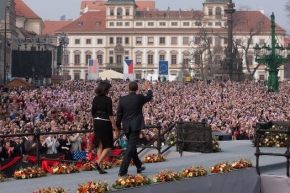Moving Toward Nuclear Abolition by 2030
April 13, 2013

This month marks the four-year anniversary of United States President Barack Obama's historic April 5, 2009 speech in Prague calling for the abolition of nuclear weapons. Commenting on the role global civil society must play, Obama stated, "A call to arms can stir the souls of men and women more than a call to lay them down. That is why the voices for peace and progress must be raised together."
Watch his speech here and then read the following IDN-Indepth NewsAnalysis article by Ramesh Jaura to explore SGI President Daisaku Ikeda's concrete proposals for achieving global nuclear disarmament by 2030. In the proposal, Ikeda calls on international public opinion to play an important role in helping the international community reach an agreement on an initial draft of a Nuclear Weapons Convention by 2015. "To this end, we must engage in active and multifaceted debate – centered on the inhumane nature of nuclear weapons – to broadly shape international public opinion," says Ikeda.
The President in Prague
President Obama addresses a crowd in Hradcany Square on April 5, 2009.
Aiming at Global Disarmament by 2030
By Ramesh Jaura | IDN-InDepth NewsAnalysis
An eminent Buddhist leader Daisaku Ikeda is calling for an "expanded nuclear summit" in 2015 to solidify momentum toward a world free from nuclear weapons and become the launching point for a larger effort for global disarmament aiming toward the year 2030.
With this in view, he hopes that non-governmental organizations (NGOs) and forward-looking governments will establish an action group to initiate before year's end the process of drafting a Nuclear Weapons Convention (NWC) outlawing nuclear weapons, which are not only inhumane but also swallow some $105 billion year after year.
"A key factor . . . will be the stance taken by those countries which have relied on the extended deterrence of nuclear-weapon states, the so-called nuclear umbrella," writes Ikeda, who heads Soka Gakkai International (SGI), a Tokyo-based lay Buddhist organization spanning the globe.
SGI President Ikeda notes with great satisfaction that signatories to the statements so far, urging putting a halt to proliferation and calling for abolition of atomic weapons of mass destruction, "include not only countries belonging to Nuclear-Weapon-Free Zones (NWFZs) and neutral countries, but also Norway and Denmark, which are members of NATO and thus come under that organization's nuclear umbrella. And yet these two countries have not only signed these statements but have played a key role in their drafting."
On the other hand, Japan, which also relies on the U.S. nuclear umbrella, has refrained from signing some of the important statements, he adds and implores Tokyo to "join with other countries seeking the prohibition of nuclear weapons as inhumane and work for the earliest realization of a world free from the threat of these weapons".
In his 2013 Peace Proposal 'Compassion, Wisdom and Courage: Building a Global Society of Peace and Creative,' Ikeda explores "the prospects for constructing a global society of peace and creative coexistence looking toward the year 2030".
Originally inspired by second Soka Gakkai President Josei Toda's 1957 anti-nuclear weapons declaration, Ikeda publishes a peace proposal every year which casts a close look at the interrelation between core Buddhist concepts and the diverse challenges global society faces in the effort to realize peace and human security. He has also made proposals touching on issues such as education reform, the environment, the United Nations and nuclear abolition.
The 2013 Peace Proposal comes in run-up to two significant events this year: The Conference on the Humanitarian Consequences of Nuclear Weapons organized by the Norwegian Foreign Ministry on March4-5 in Oslo – to be preceded by a civil society forum for a global ban on nukes, and a high level meeting in September of the UN General Assembly on nuclear disarmament.
Video Statement by International Campaign to Abolish Nuclear Weapons (ICAN) delivered during the Opening Session of the Conference on Humanitarian Consequences of Nuclear Weapons, March 4-5, 2013
Ikeda's 2013 Peace Proposal states that the huge annual aggregate expenditure on nuclear weapons globally underlines "the enormity of the burden placed on societies simply by the continued possession of these weapons". It adds: "If these financial resources were redirected domestically to health, social welfare and education programs or to development aid for other countries, the positive impact on people's lives and dignity would be incalculable."
Backdrop
The backdrop to the latest peace proposal is that since the 2010 Review Conference of the Parties to the Treaty on the Non-Proliferation of Nuclear Weapons (NPT), there has been a growing, if still nascent, movement to outlaw nuclear weapons based on the premise that they are inhumane.
The Final Document of the Review Conference notes a "deep concern at the catastrophic humanitarian consequences of any use of nuclear weapons" and reaffirms "the need for all States at all times to comply with applicable international law, including international humanitarian law."
This ground breaking statement was followed by a resolution by the Council of Delegates of the International Red Cross and Red Crescent Movement in November 2011, strongly appealing to all states "to pursue in good faith and conclude with urgency and determination negotiations to prohibit the use of and completely eliminate nuclear weapons through a legally binding international agreement."
Subsequently, at the first session of the Preparatory Committee for the 2015 NPT Review Conference held in May 2012, sixteen countries led by Norway and Switzerland issued a joint statement on the humanitarian dimension of nuclear disarmament, stating that "it is of great concern that, even after the end of the Cold War, the threat of nuclear annihilation remains part of the 21st century international security environment."
They stressed: "it is of utmost importance that these weapons never be used again, under any circumstances. . . . All States must intensify their efforts to outlaw nuclear weapons and achieve a world free of nuclear weapons." In October 2012, this statement, with minor revisions, was presented to the First Committee of the UN General Assembly by thirty-five member and observer states.
Ikeda refers to important new research on the effects of nuclear war on the environment announced in April2012 in the report 'Nuclear Famine'. Issued by International Physicians for the Prevention of Nuclear War (IPPNW) and Physicians for Social Responsibility (PSR), the study predicts that even a relatively small-scale nuclear exchange could cause major climate change and that the impact on countries far-distant from the combatant nations would result in famine affecting more than a billion people.
According to Ikeda, the SGI's efforts to grapple with the nuclear weapons issue are based on the recognition that the very existence of these weapons represents the ultimate negation of the dignity of life.
"It is necessary to challenge the underlying inhumanity of the idea that the needs of states can justify the sacrifice of untold numbers of human lives and disruption of the global ecology. At the same time, we feel that nuclear weapons serve as a prism through which to bring into sharper focus ecological integrity, economic development and human rights – issues that our contemporary world cannot afford to ignore. This in turn helps us identify the elements that will shape the contours of a new, sustainable society, one in which all people can live in dignity."
Three proposals
With this in view, the SGI President has tabled three concrete proposals:
First, to make disarmament a key theme of the Sustainable Development Goals (SDGs): Specifically, he proposes that halving world military expenditures relative to 2010 levels and abolishing nuclear weapons and all other weapons judged inhumane under international law be included as targets for achievement by the year 2030. In the proposal he issued on the occasion of the Rio+20 Conference in June 2012, Ikeda urged that targets related to the green economy, renewable energy and disaster prevention and mitigation be included in the SDGs, and he believes that disarmament targets should also be taken into consideration.
The International Peace Bureau (IPB), the Institute for Policy Studies (IPS) and other civil society organizations are currently advocating the global reduction of military spending, and the SGI supports this out of the awareness that disarmament is humanitarian action.
Second, to initiate the negotiation process for a Nuclear Weapons Convention, with the goal of agreement on an initial draft by 2015: "To this end, we must engage in active and multifaceted debate – cantered on the inhumane nature of nuclear weapons – to broadly shape international public opinion," says Ikeda.
Third, to hold an expanded summit for a nuclear-weapon-free world: The G8 Summit in 2015, the seventieth anniversary of the atomic bombings of Hiroshima and Nagasaki, would be an appropriate opportunity for such a summit, which should include the additional participation of representatives of the United Nations and non-G8 states in possession of nuclear weapons, as well as members of the five existing NWFZs – Antarctic Treaty, Latin American NWFZ (Tlatelolco Treaty), South Pacific NWFZ (Rarotonga Treaty), Southeast Asia NWFZ (Bangkok treaty), and African NWFZ (Pelindaba Treaty) – and those states which have taken a lead in calling for nuclear abolition, explains the SGI President.
"If possible, Germany and Japan, which are the scheduled G8 host countries for 2015 and 2016 respectively, should agree to reverse that order, enabling the convening of this meeting in Hiroshima or Nagasaki," adds Ikeda.
In past peace proposals, he urged that the 2015 NPT Review Conference be held in Hiroshima and Nagasaki as a vehicle for realizing a nuclear abolition summit. He still hopes that such a meeting can be held.
"Nevertheless, the logistical issues involved in bringing together the representatives of almost 190 countries may dictate that the meeting be held at the UN Headquarters in New York as is customary. In that event, the G8 Summit scheduled to be held several months after the NPT Review Conference would provide an excellent opportunity for an expanded group of world leaders to grapple with this critical issue." argues Ikeda.
In this regard, he feels encouraged by President Barack Obama's speech at Hankuk University in Seoul on March 26, 2012: "My administration's nuclear posture recognizes that the massive nuclear arsenal we inherited from the Cold War is poorly suited to today's threats, including nuclear terrorism. . . .But I believe the United States has a unique responsibility to act-- indeed, we have a moral obligation. I say this as President of the only nation ever to use nuclear weapons."
The President in Seoul
President Obama Speaks at Hankuk University on March 26, 2012
This, of course, restates the conviction he first expressed in his April 2009 Prague speech. President Obama then went on to say: "Most of all, I say it as a father, who wants my two young daughters to grow up in a world where everything they know and love can't be instantly wiped out."
Ikeda says: "These words express a yearning for the world as it should be, a yearning that cannot be subsumed even after all political elements and security requirements have been taken fully into consideration. It is the statement of a single human being rising above the differences of national interest or ideological stance. Such a way of thinking can help us 'untie' the Gordian Knot that has too long bound together the ideas of national security and nuclear weapons possession."
He adds: "There is no place more conducive to considering the full significance of life in the nuclear age than Hiroshima and Nagasaki. This was seen when the G8 Summit of Lower House Speakers was convened in Hiroshima in 2008. The kind of expanded summit I am calling for would inherit that spirit and solidify momentum toward a world free from nuclear weapons. It would become the launching point for a larger effort for global disarmament aiming toward the year 2030." [IDN-InDepthNews – February 12, 2013]


Comments:
There are no comments for this entry. Be the first to leave your own!